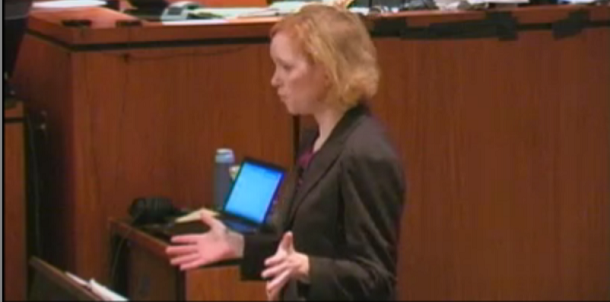
Keri Arnold delivers closing arguments Saturday during trial in Ina Ahrens' suit against R.J. Reynolds and Arnold's client, Philip Morris.
St. Petersburg, FL—Following a rare Saturday session, jurors imposed a $5 million punitive verdict against the nation’s two largest cigarette makers, capping a Florida widow’s trial for the lung cancer death of her husband. Ahrens v. Philip Morris and R.J. Reynolds, 07-013535-CI-08.
Jurors deliberated about four hours before reaching their decision Saturday, imposing $2.5 million in punitives each against R.J. Reynolds and Philip Morris for their role in the death of Karl Ahrens. The decision comes on the heels of Friday’s $9 million compensatory award to Ahrens’ family, including his widow, Ina, bringing the total damage award to $14 million.
The punitive verdict was less than the $27 million in punitives Ina Ahrens’ attorney, Gordon & Doner’s Gary Paige, sought in Saturday’s closings.
Karl Ahrens, 56, died from cancer in 1996, four years after successfully quitting a smoking habit that started in his late teens and spanned more than three decades. Ina Ahrens claims her husband developed fatal lung cancer because of a cigarette addiction fueled by the tobacoo companies' conspiracy to hide the dangers of smoking.
Saturday’s verdict capped a two-day punitive phase in which parties debated whether the tobacco companies had done enough over the last two decades to mitigate against the damage they allegedly caused by concealing the dangers of smoking for much of the 20th century.
The defense argued tobacco industry-funded research and oversight by the federal Food and Drug Administration, combined with the companies’ payment of billions of dollars to state governments, mitigated against a harsh punitive award. During Saturday afternoon’s closings, Jones Day’s Stephen Kaczynski, representing Reynolds, noted payments to various governments could go on in perpetuity. “Since 1998 Reynolds has paid $52 billion to the states, including Florida, and it’s going to go on forever,” Kaczynski said. “The companies have to pay to regulate themselves (under the FDA), and they’ve paid billions of dollars there, to the federal government. And will forever.”
Arnold & Porter’s Keri Arnold agreed, telling jurors the federal government’s sweeping authority over the tobacco industry came with the support of Philip Morris. “The FDA now has authority of everything that goes into a cigarette, everything that comes out of a cigarette, and everything the tobacco companies can say about cigarettes,” Arnold said. "The conduct that you heard about in the first phase of trial cannot be repeated under the new regulatory and legal framework in which these companies operate."
But Paige argued the billions Reynolds and Philip Morris have paid out to states under the terms of a so-called Master Settlement Agreement did not mitigate against punitives because it stemmed from a suit by the states. “They (concealed the dangers of cigarettes) for 60 years, or 50 years, then they get caught, then they get sued by all the (states’ attorneys general),” Paige said. “How is that a mitigating factor? Nothing was voluntary, nothing was done by them to help a victim, and it was a thing that was forced upon them."
Paige also contended federal oversight and tobacco industry-funded federal research did not warrant reducing a punitive award. “The reason they have to pay that money to have people do research into their product and oversee them is because they can’t be trusted. They’ve proven that for 50 years,” Paige said. “So now that they’ve proven they can’t be trusted, how is that a mitigating factor that should even be considered? It actually should be considered in giving more punitive damages, not less. Because it doesn’t say anything good about them, it only says bad things about them.”
The Ahrens case is one of thousands of similar Florida lawsuits against the nation's tobacco companies. Those cases stem from Engle v. Liggett Group, a 1994 class action claim involving Florida smokers. A jury in that case found tobacco companies knowingly produced dangerous, addictive cigarettes and hid those dangers from the public. The Florida Supreme Court decertified the class on appeal, but its ruling allows individual plaintiffs to rely on the jury’s conclusions in the original trial if they can prove the smokers at the center of their cases suffered from nicotine addiction and a smoking-related disease.
Neither the parties’ attorneys nor tobacco company representatives were available for comment.
Related Information
Read about the trial’s first phase and the compensatory verdict.
Ina Ahrens is represented by Gordon & Doner’s Gary Paige and J. David Sales P.A.'s David Sales.
R.J. Reynolds is represented by Jones Day’s Stephen Kaczynski, Edward Carter, and Jacqueline Pasek, and Hill Ward Henderson’s Craig Mayfield.
Philip Morris is represented by Arnold & Porter’s Keri Arnold.
Watch on-demand coverage of Ahrens v. Philip Morris and R.J. Reynolds.
Not a subscriber?
Learn more about CVN's unrivaled tobacco litigation library.





